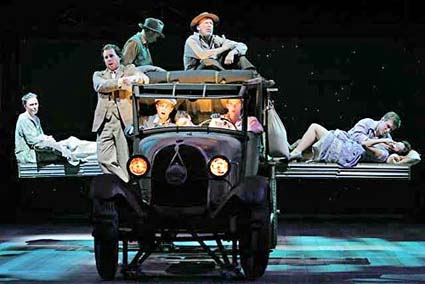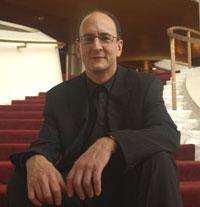 Speaking of great American operas, Tobias Picker has written two of them; Emmeline, which is an unqualified masterpiece, and An American Tragedy, which I think history will regard more dearly than its contemporary reviews might suggest. Between those two landmarks, Picker wrote a kind of “forgotten” opera called Thérèse Raquin, an epic based on the Zola novel which, like Tragedy, involves an unwanted lover being chucked overboard in favor of a more attractive alternative. Picker’s psychiatrist, if he has one, could probably make something of that.
Speaking of great American operas, Tobias Picker has written two of them; Emmeline, which is an unqualified masterpiece, and An American Tragedy, which I think history will regard more dearly than its contemporary reviews might suggest. Between those two landmarks, Picker wrote a kind of “forgotten” opera called Thérèse Raquin, an epic based on the Zola novel which, like Tragedy, involves an unwanted lover being chucked overboard in favor of a more attractive alternative. Picker’s psychiatrist, if he has one, could probably make something of that.
Thérèse Raquin premiered at The Dallas Opera in 2001 and is now having its New York premiere run, in a revised chamber version prepared by Picker, from Dicapo Opera Theatre.
The opera has three more performances this coming weekend: Friday and Saturday, February 23 and 24, at 8 p.m. and Sunday, February 25, at 4 p.m. Dicapo Opera Theatre is located at 184 East 76th Street in Manhattan, just off Lexington Avenue and directly underneath St. Jean-Baptiste Church.
I haven’t seen Thérèse Raquin yet and don’t have any critical guidance to offer but Picker is one of the very best American opera composers and his music is never less than compelling. Get on down to Dicapo this weekend.
Here’s a message from Rama Gottfried:
//
at last! here it is. tomorrow night::
::envelopes for orchestra::
5 minutes of mercury wobbling in space for a 57 piece orchestra
+ and a stacked concert of works by my extremely talented friends at
the manhattan school of music
friday, 2.23.07 – 7:30p
borden auditorium, manhattan school of music
122nd/Broadway (take 1 train to 116(downhill walk) or 125(uphill))
it will be good, you should come.
*** don’t forget to sit in the balcony, it sounds best from there.
the stairs are just as you enter the hall on both sides.
\\
high 5s to all,
 Since it’s opera week here at Sequenza 21 and there’s a lot of chatter in the comments about transplanting operas between cultures and Galen has raised the topic of fugues in the invisible YouTube video below, it seems somehow fitting to mention that Miller Theater and the Oberlin Conservatory of Music are presenting tonight and tomorrow night the U.S. premiere of Lost Highway by Austrian composer Olga Neuwirth, a multimedia opera based on the weird and wacky David Lynch film of the same name. Film buffs will recall that Lynch’s film involves sex, murder and a character named Fred Madison who mysteriously becomes Pete Dayton through a mental disturbance known as “psychogenic fugue.” Can you dig it?
Since it’s opera week here at Sequenza 21 and there’s a lot of chatter in the comments about transplanting operas between cultures and Galen has raised the topic of fugues in the invisible YouTube video below, it seems somehow fitting to mention that Miller Theater and the Oberlin Conservatory of Music are presenting tonight and tomorrow night the U.S. premiere of Lost Highway by Austrian composer Olga Neuwirth, a multimedia opera based on the weird and wacky David Lynch film of the same name. Film buffs will recall that Lynch’s film involves sex, murder and a character named Fred Madison who mysteriously becomes Pete Dayton through a mental disturbance known as “psychogenic fugue.” Can you dig it?  Speaking of great American operas, Tobias Picker has written two of them; Emmeline, which is an unqualified masterpiece, and An American Tragedy, which I think history will regard more dearly than its contemporary reviews might suggest. Between those two landmarks, Picker wrote a kind of “forgotten” opera called Thérèse Raquin, an epic based on the Zola novel which, like Tragedy, involves an unwanted lover being chucked overboard in favor of a more attractive alternative. Picker’s psychiatrist, if he has one, could probably make something of that.
Speaking of great American operas, Tobias Picker has written two of them; Emmeline, which is an unqualified masterpiece, and An American Tragedy, which I think history will regard more dearly than its contemporary reviews might suggest. Between those two landmarks, Picker wrote a kind of “forgotten” opera called Thérèse Raquin, an epic based on the Zola novel which, like Tragedy, involves an unwanted lover being chucked overboard in favor of a more attractive alternative. Picker’s psychiatrist, if he has one, could probably make something of that.
 The big news in London this weekend is a £1 million (almost $2m) tie-up between English National Opera and Sony PlayStation to put games consoles into the foyer of the hallowed London Coliseum. This is an opera house renown for its
The big news in London this weekend is a £1 million (almost $2m) tie-up between English National Opera and Sony PlayStation to put games consoles into the foyer of the hallowed London Coliseum. This is an opera house renown for its  “What to Wear” ended its all-too-short run yesterday. When you find out its schedule for performance in New York, get your tickets right away. Better yet, get tickets for two dates (or more), because you’ll want more than one evening. As reported and commented on last week, this is the opera with music by
“What to Wear” ended its all-too-short run yesterday. When you find out its schedule for performance in New York, get your tickets right away. Better yet, get tickets for two dates (or more), because you’ll want more than one evening. As reported and commented on last week, this is the opera with music by  Good piece in the
Good piece in the  Michael Gordon’s new post-rock opera
Michael Gordon’s new post-rock opera  If there were ever any doubt that
If there were ever any doubt that